Text
omg this is everything
Making this healed something deep within me I almost cried
4K notes
·
View notes
Text


Dazatsu covers based on "Go for it, Nakamura" and "Go for it again, Nakamura"
215 notes
·
View notes
Text
Literally this!! Because the themes of bsd are so present in classic literature (not only because they have to be due to the... yknow... classic lit author characters) and the structure of it really encourages the audience to look deeper at tiny details to form an accurate narrative.
You want an unreliable narrator? Take a look at how Dazai sees himself vs how Atsushi sees him. Yes Atsushi has reasons to put Dazai on a pedestal but he doesn't look past his flaws, he just accepts them and moves on rather than making them the be all and end all that other characters (and Dazai himself) do.
You want that conflict of morality? The whole plot. You want it to get more complex? Take a look at Fyodor, someone doing absolutely heinous acts for what he sees as world peace. Take a look at Atsushi, terrified of being anything but good and avoiding what he sees as "immoral" actions purely for the selfish reason of saving his own soul.
The aching lonliness present in so much post-war Japanese literature as a direct result of the westernization of Japan is so blatant and so well-done. Dazai is in a world unto himself most of the time, and he's only barely pulled out of it by the characters around him. Look at Oda, a self-described sea creature travelling through a world he doesn't belong in but loves anyway. Ango, made to be a traitor and entirely hating the role, forced into isolation because it's what's safer for those around him. And Akutagawa, so hell-bent on a goal that others won't understand that he isolates himself before others can reject him into isolation.
To me, understanding our relationships with others is the crux of literature. Conflicting moralities, what we keep to ourselves, how people are shaped by the decisions of those who came before them and those who send them on their different paths. Setting bsd after the war was absolute genius because it creates this shared experience which so shapes the culture of Yokohama and shapes its characters without making it clear to the characters in question that this is what has impacted them so deeply, because, well, everyone went through the war. It's not until we get to Fukichi and Yosano where it's made so explicit we can't ignore it anymore. The war is the catalyst for unrest and the elephant in the room until we see its claws come out of the dirt and realize what's been rumbling under the characters' feet this whole time.
I'm not going to get into the interdependence of every character on the other in bsd, nor am I going to get into cycles of abuse and the power of human connection because they're so overdone in analysis it would be useless.
But this is what literature has been getting at for so long. It's looking into the eyes of someone who has been long dead, someone a million miles away who has made a million different decisions than you would ever think of, and being able to say "so this is how it is for you. This is how you've come to understand the world"
I would say that bsd gets so many people into classic literature but to be fair I think it attracts the type of people who would get into it anyway and just needed an excuse.
44 notes
·
View notes
Text
Holy crap this one was good
Something incredible to me in Beast is just how... wrong Dazai was so often (and, by concequence, Gin). And how he was wrong in a very opposite was from og!Dazai's thinking.
Getting the memories from og!Dazai gave him many advantages, but it also held him back when it came to actually seeing the other people around him. Especially Atsushi and Akutagawa. He was convinced about being born good or evil and innate natures, which is something the story disproves time and time again.
In his mind, it didn't matter that he'd groomed Atsushi for almost five years into being the white reaper. It didn't matter that he killed himself infront of him after making himself the central point of Atsushi's frail sanity. It didn't matter that he fired Atsushi from his one remaining purpose. Why? Because Atsushi was "born good" in his mind because he was good in the original world and therefore any evilness groomed into him would be easily undone without any lasting consequences in his mind.
If he saw Atsushi being reformed slowly by Mori, he'd get to the wrong conclusion. He'd attribute it to nature rather than to Mori being able to rehabilitate him.
And this also shows in his treatment of Akutagawa. He thinks of Akutagawa as being inherently bad because he was in the mafia originally. The whole story is him being victim to confirmation biases when it comes to him and, because of that, the same happens to Gin. His idea with Akutagawa was never, at least to my understanding, to make him into a good man of the Agency, but rather have the ADA hold him under their care to unleash against threats. He didn't believe Akutagawa could become a proper ADA member (because he wasn't originally) but believed that the Agency would take him in anyway (because they took in Dazai and Kyouka in the original universe) and keep him from lashing out unless there was an enemy ahead of him.
And Gin gets fed this belief. It's why she doesn't talk like there will be a point in which Akutagawa might be reformed into a good person. Or that what he needed was to learn to calm down and organize his priorities. She believes he cannot change because that's what Dazai has taught her. Akutagawa's objective by the end of Beas isn't finding her anymore because he needs to better himself for himself and to prove Gin wrong. Not to reach her expectations or demands, but to prove her wrong, to show he is capable of change.
And, surprisingly enough, it's Atsushi who has the best take about Akutagawa in the final chapters, even though in Akutagawa's mind all of their judgements were put as if the same. From Atsushi's words, at least, Akutagawa is described as someone who is bad, who can't understand or separate violence from their objectives and who'll prioritize the violent option above even his objective, but he never expresses the opinion or feeling that that's his nature or he was born, likely because Atsushi know better than anyone how much someone can change or be changed. Atsushi doesn't think Akutagawa is a good person, but doesn't see him as someone incapable of becoming one (which does have some beautiful implications of SSKK always being able to understand esch other better than other can, even if they don't react or deal with the knowledge all that well).
And Dazai in the original universe thinks a lot more like Beast Atsushi than Beast Dazai (I could write a whole novel about the similarities between Original Dazai and Beast Atushi, because oh my god are they interesting). He doesn't believe in good and evil as something inher of someone nor does he see good and evil as concepts that are set in stone, but rather something personal to individuals. It's why I think even if Dazai was sent back in time to the exact point Beast Dazai received the memories, he would have gone through a completely different route when it came to changing the outcome of things. But also because he's changed since leaving the PM and it doesn't seem like Beast Dazai ever really grew up after getting the memories, he stayed both childish and a child.
132 notes
·
View notes
Text
I wanna talk about Odasaku for a second, and his character arc in Dark Era
I love Odasaku, and one of the things I love about him is that he's not just there to be the friend Dazai loved and lost, he's a really deep character who grows over the course of the Dark Era novel, and he learns how to speak up.
I feel like his arc is mitigated in the anime, and I'm not going to be blaming it necessarily, it's just that a book written in first person POV is able to achieve a lot more depth to the MC over the anime , which is forced in nature to take a more third person, observational take to the character.
Dark Era spoilers, obviously.
The first thing I would like to bring up is Oda's personality, and for that, I'm actually going to start this analysis off with using a quote from Beast, of all things, because this was honestly the best description of Odasaku ever.

The best way to describe Odasaku's personality is obliviously perceptive. He's really smart, and somehow a complete airhead at the same time. When you read either Dark Era or The Day I Picked Up Dazai, you can sense this in an instant. How this pertains to his relationship to Dazai in particular is that he sees things. He knows that Dazai is hurting deeply, he's one of the only people who sees past the dark exterior and the child deep within, but at the beginning of the book, he won't say anything. He puts Dazai on this pedestal in a sense, and doesn't believe that his input is warranted, and he says nothing, even when Dazai is a walking cry for help. After listening to Dazai casually admit to a suicide attempt via banging his head against a hard tofu block without batting an eye, that's when Ango arrives and tells him off.

However, the conversation quickly shifts, and the matter isn't brought up again.
The next time someone tells Odasaku to speak up when he's summoned to Mori's office, and is greeted with a rather...bizarre scene. Still, he's a low-grunt of the Mafia, and Mori is the boss, so he lets whatever stuff is going on fly, until he eventually interrupts, ignores whatever was going on, and announces his presence. Which prompts the following conversation:

Still, it's apparent he doesn't take these words to heart, and continues to perceive almost everything, but never comments. However, something soon happens which brings to the surface just how deeply ingrained Oda's reticence truly is.
After Oda was chased by the enemy snipers, most of them had enough holes in them never to rise again. Until one picks up a gun and aims it at Dazai, the enemy executive, all other backup too far away to offer any aid. Instead of trying to avoid it or stop it, Dazai walks right up to the enemy and says , paraphrased "shoot me, please shoot me." The whole time, Odasaku's desperation is palpable, and unlike the anime, he attempts to stop Dazai from this blatant self-destruction by calling his name and then screaming it, thinking that he felt they were a million miles apart. After the ordeal, when Dazai faces his friend again, he offers all his excuses, how he knew the sniper would miss, but Odasaku wasn't satisfied. And this is where we get the first hint at how Oda really feels about this:
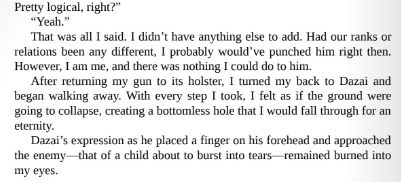
He wants to say something. He wants to punch him for the stunt Dazai just pulled, because he sees the truth. He sees the child inside of him. But once again, he's restrained by the apparent gap between them in rank and mind. Another important thing to note is that throughout the novel, Odasaku considers their difference in rank a bigger barrier than Dazai does. He makes comments about Dazai helping him, the low runt in the Mafia, but the executive doesn't care. Here once again, Oda is inhibited by this apparent gap between them, but this scene is also growth for him in the sense that he understands that there's a problem here. Earlier, he passively listened to Dazai speak of suicide, but faced with a barely disguised attempt, with the true demons inside of Dazai's mind, he wants to stop him, to reach out, to tell him that it's not ok. But he can't. Not yet at least.
After a later incident, we're given a flat-out description of Odasaku's philosophy, and why he chooses to remain silent. When the two of them are at the restaurant, discussing the enemy, and when Dazai realizes they might actually be a formidable opponent, he laughs, elated with the notion that perhaps he might be beaten. And that's when we get perhaps the clearest look into Odasaku's mindset:
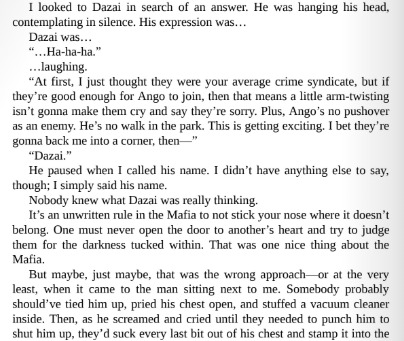

There's a lot to unpack in this interaction: first, we see how much Odasaku truly cares for Dazai, how much he wishes he could rid his heart of the darkness buried deep inside. But the problem is, he believes he can't. He doesn't think he could do anything, at first, he's not sure what to say to him because what could he say? He doesn't think he can reach him. And then the all important line "What we see is everything, and everything we see, we ignore. All we can do is stand before the deep ditch between us and others and keep silent." The thing is, not everyone sees everything. He doesn't realize this. He's so oblivious, he can't even comprehend that he's more perceptive than others, almost like Ranpo when he was younger. He doesn't know what to do with the information he receives but to ignore it, as he says, to see the distance and remain silent through it. But still, he makes a halfhearted attempt to reach out, but is interrupted when Dazai's phone rings, and doesn't bring it up again.
The biggest turning point is the kids and Gide. Gide, who drags Odasaku, a character who seemed to have the healthiest will to live, into the darkness. By removing all his hope, his proof that he could one day write a novel and give up killing forever, he brings Oda down into the pit of despair that he lives in, the pit that Dazai lives in. Where the sun won't shine again, and all that's left is revenge and then death. This is where the tables turn, and now Dazai is trying to save Odasaku from that darkness that he knows all too well. He tells him useless platitudes, cliches that must have been uttered to him over and over that he knows won't work, but Dazai is desperate to save the one he's on the verge of losing. But Odasaku won't let himself be consoled, and he goes on the suicide mission to fight Gide. And only now, now that he's about to die, now that he's in this place of solitude and despair, that he reflects on Dazai and their relationship.
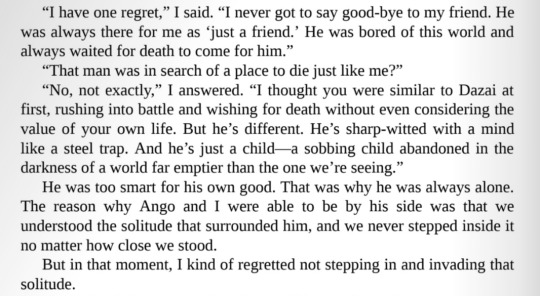
It's only at the end does Odasaku wish he would have said something. When he understands the darkness, he sees Dazai for what he truly is - a lonely, sobbing child. And it's only after this realization that he should have invaded the solitude does he speak up when Dazai arrives, and tells him to be a good man. Because he realizes that the darkness is going to overwhelm him unless something changes, and with his dying breaths, Odasaku gives over the advice that changed his life, not a way out of the darkness, but a way to brighten it just a little, and make living a little more beautiful. Something only he could understand, having tried to walk that path for himself. It can't be that it never occurred to him earlier that Dazai's mental health may have benefited from a...change in vocation, but he never thought it was his business to say anything before. But now that the darkness has consumed him, that's the final push for him to finally say something and reach out to his friend at the last moment before it was too late.
And though I don't think the anime did all of this justice, the parallels between these moments will always kill me.
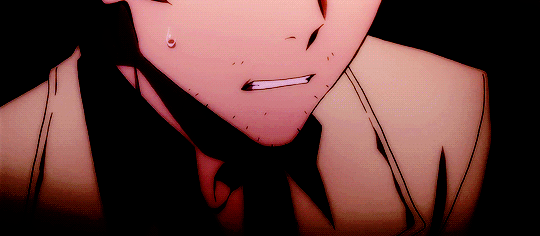
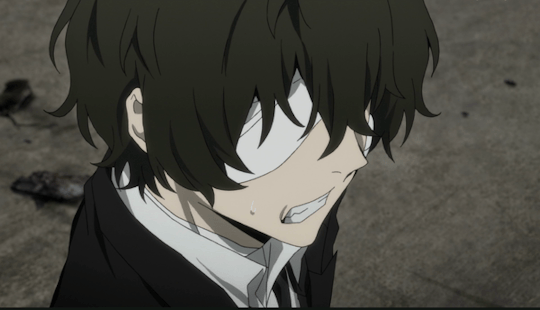
173 notes
·
View notes
Text
gghghhgjghgjghgjghgjghgj








My take on some gender bent versions <3
5K notes
·
View notes
Text
Holy shit this deserves so many more notes this is insane
Toska

Pairing: Fyodor Dostoevsky x Dazai Osamu
Content warnings: non-sexual choking, non-sexual nudity, non-consensual touching, references to suicide and sh, implied unrequited relationship, unhealthy relationships
Excerpt: “Fyodor has to ground his head against the carpet to cauterize his heartache.”

Fyodor is, upon close observation, a quite ugly man.
He is all misshapen joints, scabbed fingers, and sunken eyes. His eyelids strain to even blink, the skin stretched thin as paper.
Fyodor Dostoevsky is only pretty from certain angles, where light hits his jawline but shadows the rest of his body, and he is made briefly, into a painting. The picture of a corpse that hasn’t been told to decay. Dazai happily marks it with cigarette butts.
“I love you,” Fyodor says on one such afternoon.
Dazai says, “I know,” as he retches into his one-room, no-door bathroom. It’s ergonomic; Fyodor will immediately know whether or not he will have to drag Dazai out of the tub whenever he visits.
“I love you,” he presses, experimentally bold, the sharp edge of his mind heat-dulled. His tongue is heavy and stupid. “And if you knew how to…” Would you choose me?
Laughing through gagging, or gagging through laughing, Dazai says, “what?” but the lilt follows the Japanese “no.”
Fyodor lies back down, sweating in a pile of blankets, cold. “Then who else?” He grits through perfectly closed teeth.
“Nobody,” and even that word is in the cadence of another’s name as Dazai spits another lie into the sink. “If I could, it might be you.”
Fyodor back sticks to the sheets. He is downing in cold liquid as he says lightly, “don’t play this game with me, Osamu.”
“There’s no games! Now, now, don’t be so angry,” he’s right, Fyodor is so angry his corpse might rot awake, “you wouldn’t want my love anyways—“
Dazai leans into to kiss him, unrinsed mouth and all, “—because then, I wouldn’t be here.”
Fyodor pushes his face away, cringing. The unspoken question that succeeds that statement was already answered the moment they met. Fyodor knows this. Hurt pulses out of from his fingertips, spreads up his cigarette-marked elbows and urge him to move. His parietal lobe is numb. The weekend is at least five-eighths ruined; Fyodor will likely find a back alley junkie closet to mope within for the next week.
He shoves the blankets off, moves to get away until Dazai circles around him like a traitorous snake. “Fyo—Fed…Fedya,” he can’t even come up with his own nicknames, “stay, I have enough booze to last us two days.”
Dazai says it clumsily, medicated, with his arms loose and caging around Fyodor’s scrapyard body—Fyodor would pull them off now—useless crab arms. Peel the bandages off and eat them.
“Let go.” He pushes, and then when that doesn’t work, he pulls. Fyodor doesn’t have the mind to be dangerous at this moment, only the heart to be. He wants to find a safe place to rot.
(There are no safe places for him. Fyodor made sure of that, hundreds of nights and bodies ago.)
“No,” Dazai squeezes, and Fyodor’s body is even colder. “What did I say? What did I do?”
He does not want to be near Dazai right now, with all of his cat-like confusion and innuendos and riddles, despite it Fyodor habitually being able to return that sort of play. This afternoon, his brain is a fog and his heart has a traitorous homesickness—disaster looms.
“I want to go home.” He says flatly.
“What home?” Dazai asks. Fyodor should bite Dazai’s tongue out.
Fyodor’s hands roam up and down the highways of Dazai’s thighs. They are marked up—used—maybe a lamb or two has lost its way along his roads.
“I’ll bite your tongue out if you kiss me with vomit still in your mouth.” It’s a half truth, half lie. He would bite Dazai’s tongue out; truth. He wouldn’t kiss Dazai if he tasted like vomit; lie.
Dazai sticks his tongue out at him and digs his prettily manicured nails into Fyodor’s chest.
He wants Dazai in wholes disguised as halves, and Dazai wants Fyodor in halves that are halves. Throughout their time in each other’s sphere, Dazai had never lead him to believe anything else.
He didn’t have to.Traitorous inner voice. Fyodor’s hands ache; from his palms to his fingers, he bleeds hurt.
Where would Fyodor go from here? No really, where(what) does Fyodor even have? In his current rotation, he has an apartment complex in Bangladesh, a prison cot in Russia, his working office at [redacted], Dazai’s old shipping container here, in Japan—Fyodor wants to choke the leech of interest that immediately latches onto the thought of anything “Dazai’s”—What about staying at Nikolai’s? Sigma? …Bram? ……Fukuchi?
With each name that flits by his heat-addled mind Fyodor only further curdles with desperation-hate. Hate-desperation. He curls into his own body protectively, still in Dazai’s arms, and he can’t even pretend that he isn’t cold.
No where to go but through, then.
Fyodor finds where lines map Dazai’s wrist and squeezes. Dazai hisses, flinching backward as Fyodor twists. He puts both hands Dazai’s ribs, as if he can further cave them inwards, pushing him flat on the bed.
Fyodor is straddling on him, stark naked and flaccid, pallid and skintight, ugly the way a horror movie is under good lighting with his fingers around his victim’s throat. Dazai in beneath him, panting, thin and soft—godless curls spread out like dozens of cut brown wings. Skin gold lined enough to make a devil weep.
Dazai calls him “pretty,” in between his garbled choking and Fyodor almost wants to thumb his eyes for lying to him again. He doesn’t.
Fyodor enjoys choking Dazai less only because he knows Dazai will always enjoy it more. This time, he feels nothing at all.
Dazai’s arms frantically scrabble against grip, survival instinct kicking into overdrive as his nails rake against Fyodor’s wrists. Fyodor watches, as he has done dozens of times, the moment that light reappears within Dazai’s hole-dark voids seconds before he goes unconscious.
Dazai paws at him, whimpering quietly as his eyelids flicker dreamily. He is the picture of a perfect victim; an orphic martyr for himself. Petulantly, Fyodor releases him.
Sputtering, Dazai curls, staining the bed with spittle. He heaves as if to gag again, but swallows hard, turning to Fyodor unhappily, “what was that?”
“What was what?”
“You held on longer last time.”
Fyodor moves to snag a blanket off the bed, cover his own body, and grasp around the floor for his clothes.
“Why are you angry at me?” Dazai repeats from the bed, new bruise marks adorning his neck with an objective kind of beauty. Dazai, unable to ever live and let lie when the situation ever actually calls him to, says, “I like you, isn’t that enough?”
Fyodor cannot help the way he shivers, made stupid by the heat and the cold, the yesses and nos, and the man who may be the only one who will vaguely remember him if he fails. When he succeeds. He won’t fail.
Fyodor has to ground his head against the carpet to cauterize his heartache. He needs to trade out this body soon.
“I’m leaving. Do whatever you please with my phone.”
He wants to pray. To lick his wounds in dignity. Dazai can be tortured another day, when Fyodor does not feel like he might give up everything for the proximity of another body.
He tugs his shirt on, staggering to his feet but Dazai, Dazai will not let him go, Dazai yanks his arm with enough force to dislocate and they fall in a heap. Dazai will push him away when Fyodor wants him and pull him close when all Fyodor wants is absolution; he keeps—digging up Fyodor’s corpse to ogle, prodding at the cockroaches in his mouth and peeling his skin like dried dates—neither the man nor the though of the man will let Fyodor go, and now, ever since the day that Dazai’s criminal profile burrowed a home in his skull, Fyodor’s isolation has become unbearable.
“What did I do to deserve this?” He rasps.
“You wanted it,” Dazai says, in response to something else entirely. “You don’t deserve to feel sorry for yourself. Not after everything you’ve done.”
“I never wanted you.”
“And yet, here you are.”
Laughing as if he isn’t a punishment, his fingers rake Fyodor’s hair taking clumps of strands with it. Dazai is the Yama to his Christ. The idea of finding divinity in the mundane is far too trite of a trope these days.
“Do you,” but Fyodor still licks his lips. Dazai’s gravity makes him a fool. “Do you really think that I’m—”
Dazai leans down and kisses the crown of his head as if he is a child. Or, maybe, one of his horrible high school flings.
He pities the corpse in Dazai’s grasp. It is shaking and whimpering, and it is surely not Fyodor.
25 notes
·
View notes
Text
so im a sucker for tropes that humanize larger than life characters . Sue me!!
I know that the final showdown is about 99% almost completely canonically going to be between Atsushi and Akutagawa vs Fyodor but imagine . If u will:
Dazai and Fyodor having a Fucking Fist Fight


In this scenario:
Amenogozen is dead or occupied
Dazai is more injured and exhausted than Fyodor is.
Its destruction all around, smoke in the air, craters of stone in the ground—two men standing amongst a ruined battlefield. Dazai and Fyodor, face to face amongst the blood, sweat, and ruin that Fyodor had said he would always be above in mersault.
There’s a gun in between them, nestled in the dirt. There are no more pawns on the table, only two kings staring each other down on a wasteland checkboard. Dazai’s leg is broken. Fyodor is breathing hard.
Dazai lunges for the gun at the same time Fyodor does—in a mad scramble, he kicks out Dazai’s bad leg—Dazai screams in agony as Fyodor pins him down. The gun is kicked several feet out of reach.
But Fyodor is physically weak. The only reason why Dazai hasn’t already knocked him out cold is because of his broken leg.
Dazai elbows Fyodor in the chest so hard he breaks a rib. Fyodor chokes, his chest knocked free of air and ringing with pain as he tries to see Dazai through his rapidly blurring eyes.
He was flipped over in the scuffle, but Fyodor reaches down and grabs Dazai’s leg and digs his fingers to where he thinks the bones separate and presses. Dazai is so blinded by pain, he briefly lets go as Fyodor punches him in the face.
Dazai’s nose is bleeding, but Fyodor doesn’t have time to appreciate it as he pushes Dazai off—flips them over again—he is straddling Dazai with his weight on the former’s broken leg. His hands seize Dazai’s neck and grips with all his might.
Dazai’s hands claw at his face animalistically, scrabbling for purchase on Fyodor’s hair, eyes, anything. His eyes meet Fyodor’s—both of their swirling pairs of darkness are finally awake, alive, burning—and oh, this is what Dazai had meant, hadn’t he? In the silence of Dazai’s strangled wheezes and his nails dragging up dust, Fyodor realizes: this is what it means to be alive.
Dazai spits into Fyodor’s face. He lets go reflexively, yelping with disgust as blood-spit blinds him, while Dazai is gasping as he crawls for the gun; he’s halfway there before Fyodor blindly grabs one of Dazai’s legs. But it’s not the broken one—Dazai pivots his ankle and stomps with all of his might as Fyodor screams because several of his fingers as broken.
Dazai’s hand finds the gun.
56 notes
·
View notes
Text





they can be cuddly too 🩷
all credits to the original artist @anikenom on X
6K notes
·
View notes
Text
i need everyone to understand the poetry of curly turning a blind eye to anya’s suffering only to be robbed of his autonomy and voice as she was and then forced to observe jimmy’s crimes and the abuse of his own body
58K notes
·
View notes








